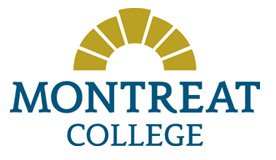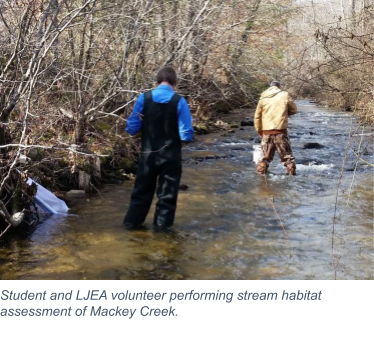University Research Collaboration and Student Support
LJEA collaborates with colleges and universities across western North Carolina to help train students in environmental science and related fields and to conduct faculty-directed research in the Lake James Watershed.

A student intern from UNC Asheville, Levi Reece, provided key mapping and analysis support for the completion of the 2018 State of Lake James Watershed report. Levi has since founded an environmental consulting company in McDowell County and continues to work with LJEA. David Penrose, owner of Penrose Environmental and adjunct professor at UNC-Asheville, developed a rapid stream ecology assessment protocol for LJEA , trained students and LJEA volunteers, and led field assessment teams for the 2018 watershed assessment. In 2019, Dr. David Gillette directed a team of students in a study of fish communities in the watershed and the impacts of disturbance on the habitats and structure of those communities.

Dr. Mark Brenner at Warren Wilson College supervised undergraduate research assessments of Crooked Creek and Mill Creek and provided LJEA with (free) laboratory analyses of the concentrations of Chlorophyll in Lake James. Mark is a key member of LJEA’s Community Science Committee and serves on LJEA’s Board of Directors.
In 2021 and 2022, Professors Zhang, Borges, and Brenner supervised a student, Megan Iannantouno, in a study of microplastics in the Lake James watershed.
In addition, in 2022 and 2023, Dr. Olya Milenkaya and student Daniel Baron performed monitoring of bald eagle nests at Lake James and Warren Wilson student Jayden Roberts is inventorying the current quality and risk of degradation of the riparian buffers along the Catawba river upstream of Lake James.

Dr. Shea Tuberty and others at Appalachian State University supervised an Environmental Toxicology class as they performed a water quality assessment of the Linville River watershed, supporting the 2018 State of the Watershed report. In 2022 and 2023, LJEA employed an AppState student, Jesus Lovaton, as an intern to examine Emerging Contaminants in the Lake James watershed. His research is providing important information that will help guide LJEA’s water quality monitoring program and conservation advocacy in the coming years.

Josh Holbrook, Assistant Professor of Environmental Science at Montreat College, leads a team of students in a wetland study of the western end of Lake James and the Catawba River just upstream of the lake. The team is inventorying wetlands and describing their physical and biological features. They will also be conducting faunal surveys in order to determine the species that inhabit these wetlands. Student researchers Whitney Kincaid and Brenna McEntire won 2nd place in our November 2021 college-level student poster contest, receiving an award of $150.
Another graduate of Montreat College, Megan Frady, completed a summer internship with LJEA studying invasive terrestrial species in the watershed. Two of the products of Megan’s work are an educational slide presentation and an informational flyer that are available to teachers and others interested in teaching our youth how to protect the environment.
Dr. Dottie Shuman, Professor of Outdoor Recreation Studies at Montreat College, is assisting LJEA in the development of our Multi-generational Environmental Field Science Experiences program. This program, which LJEA piloted in the fall of 2023, brings together senior volunteers, college student mentors, and high school students from Avery, Burke, and McDowell counties to understand and appreciate the science involved with environmental protection and restoration, and to build better understanding and appreciation of local natural resources.

Western Piedmont Community College has joined our group of post-secondary collaborators. A recently retired WPCC faculty member has joined our Citizen Science Committee and three current faculty members are engaging their students in LJEA field studies and other programs.
WPCC hosted the 2021 and 2022 Lake James Watershed Symposium. At our first symposium, hosted by WPCC at the Foothills Higher Education Center in Morganton, WPCC student Cadence Davis won 1st place in our college-level student poster contest, receiving a $250 award. Cadence has continued working with LJEA, currently performing an assessment of the White Creek watershed. White Creek is one of only two streams in the Lake James watershed that the State recognizes as “impaired.” Cadence’s work is setting the stage for LJEA to complete a watershed restoration plan that will address the sources of the impairments. Finally, we are pleased that Stacey Johnson, professor of chemistry at WPCC, has joined our Community Science committee. Her expertise is helping us improve our water quality monitoring program and better prepare for coming challenges.

Our university collaboration represents a true win-win situation. LJEA support helps college students and faculty design and conduct practical, in the field, research. Students get the opportunity to apply their classroom knowledge to field experimentation, along the way working closely with their faculty advisors, environmental professionals, and LJEA volunteers. The students invariably report that the work deepens their understanding of the environmental and aquatic ecosystems, often noting that it inspires them to dig deeper into their chosen field. Not only does LJEA directly benefit from the university research, we have also been able to build this network of informal advisors consisting of both faculty and experienced, practicing environmental professionals.
During 2023, LJEA will provide $16,000 for student intern and faculty supervised research assistance for university collaboration. These funds, in addition to our continued use and support of the Environmental Quality Institute that provides State certified water quality laboratory services and data analysis, helps us ensure that we are keeping a careful watch on the Lake James watershed, how it is changing, and how those changes may impact the environment and ecosystems of our streams and the lake. Your assistance in funding this important program is greatly appreciated.
Some of the student papers and presentations prepared by LJEA interns and supported researchers are noted below.
Frady, Megan, Invasive Plants – A Powerpoint Presentation for Lake James Environmental Association, Montreat College, September 2021.
Faculty Advisors: Joshua Holbrook
Faculty Advisors: Dr. Yuemei Zhang, Dr. Kim Borges, and Dr. Mark Brenner
Faculty Advisors: Dr. Mark Brenner, Robert Hastings, Dr. Mary Bulan
Faculty Advisor: Dr. David Gillette
Faculty Advisor: Dr. David Gillette
Faculty Advisor: Dr. David Gillette
Faculty Advisor: Josh Holbrook
Faculty Advisor: Dr. Shea Tuberty